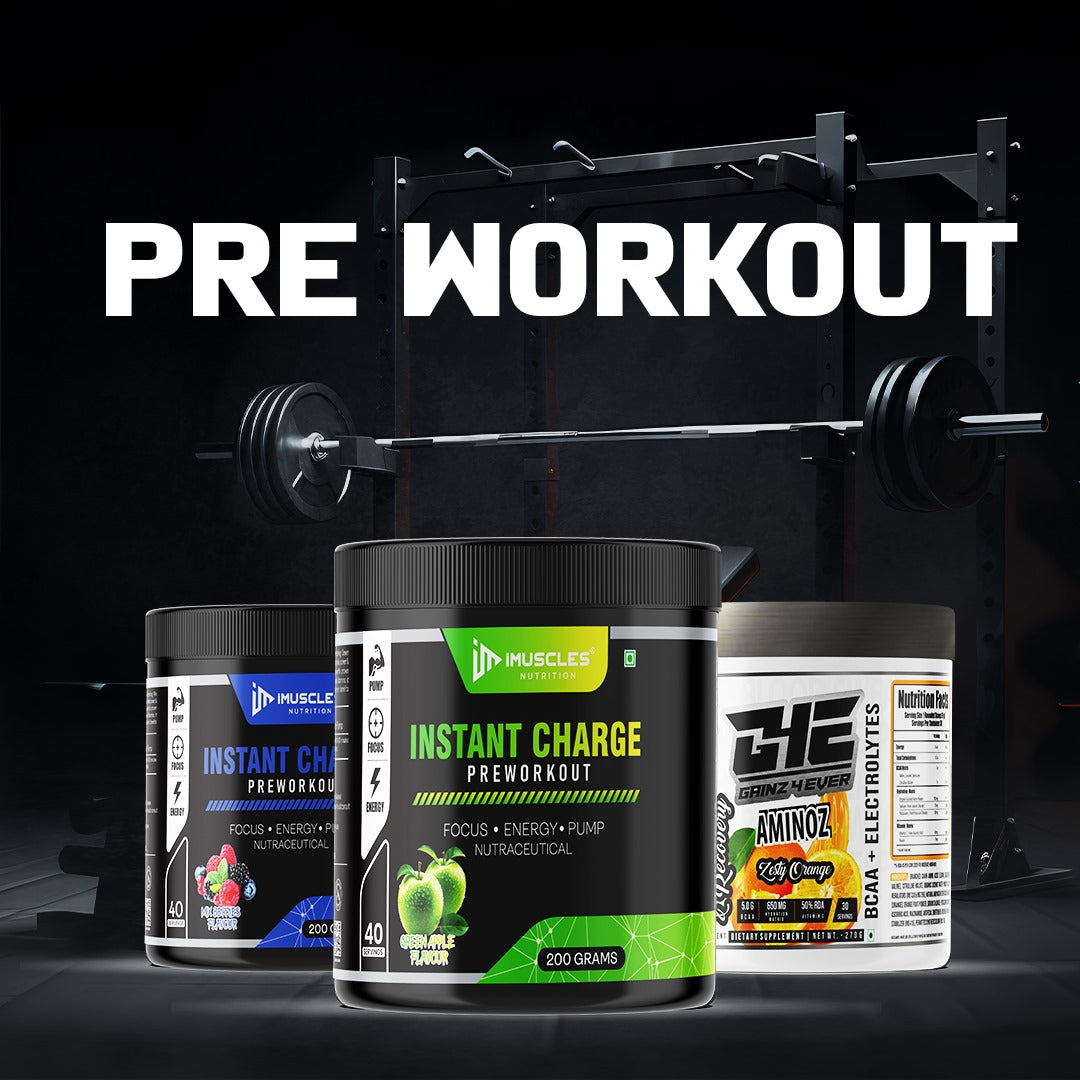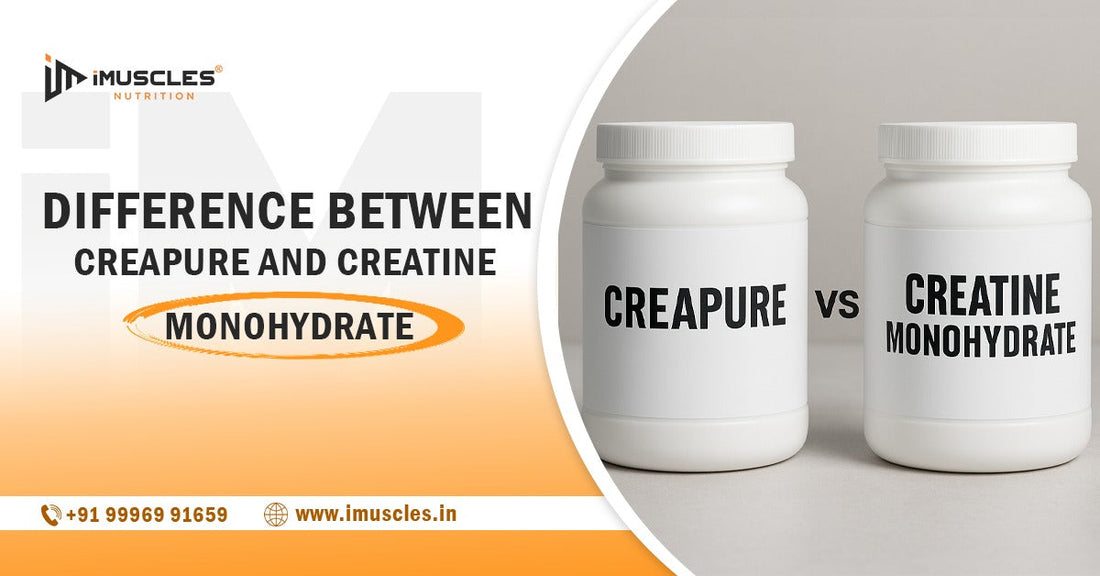Creatine is one of the most popular and extensively researched supplements in the fitness world. It’s renowned for its benefits in improving strength, increasing muscle mass, and enhancing athletic performance. If you're familiar with creatine, you’ve probably encountered two specific forms: Creapure and Creatine Monohydrate. While these two terms are often used interchangeably, they are not the same. So, what exactly is the difference between Creapure and Creatine Monohydrate, and why does it matter to you as a consumer?
In this blog, we will dive deep into the differences, similarities, benefits, and considerations of these two forms of creatine, helping you make an informed decision on which one is best suited for your fitness goals.
What Is Creatine Monohydrate?
Creatine Monohydrate is the most common and well-researched form of creatine. It consists of a creatine molecule bound with a water molecule, which helps in enhancing the absorption of creatine into the muscles. Creatine Monohydrate is widely used among athletes, bodybuilders, and fitness enthusiasts to increase muscular strength, improve exercise performance, and enhance recovery times.
Why Creatine Monohydrate Is Popular:
- Effectiveness: Studies show that Creatine Monohydrate is highly effective in improving strength, power, and performance during short bursts of high-intensity activity.
- Cost-Effective: Creatine Monohydrate is relatively inexpensive compared to other forms of creatine.
- Wide Availability: It is available in almost every supplement store and comes in various forms such as powder, capsules, and chewables.
What Is Creapure?
Creapure is a branded form of creatine monohydrate produced by the German company AlzChem. It is widely recognized for its high purity, as it goes through a specialized manufacturing process. The name “Creapure” refers to the brand's unique, high-quality product that is free from impurities, contaminants, and by-products typically found in lower-quality creatine supplements.
Why Creapure is Different:
- Purity: Creapure is known for its high purity levels, ensuring that users get 100% creatine monohydrate without any unwanted impurities.
- Manufacturing Process: Creapure is produced using a patented manufacturing process that guarantees the absence of contaminants like creatinine (a by-product of creatine), which could cause digestive issues or reduce effectiveness.
- Quality Control: Since Creapure is manufactured in Germany, it adheres to strict quality control standards, ensuring the highest possible standards of production.
Creapure vs. Creatine Monohydrate: Key Differences
Now that we have an understanding of what Creapure and Creatine Monohydrate are, let’s explore the key differences between these two creatine types.
1. Purity
One of the most significant differences between Creapure and standard Creatine Monohydrate lies in purity. While Creatine Monohydrate is effective, it can sometimes contain small amounts of impurities or by-products such as creatinine, which is a breakdown product of creatine. These impurities might cause digestive discomfort or reduce the effectiveness of the creatine.
Creapure, on the other hand, is recognized for its purity. The brand guarantees that its creatine is 99.9% pure, with no impurities. The production process eliminates most by-products, which means that Creapure has fewer side effects and is generally easier on the digestive system.
2. Manufacturing Process
The manufacturing process plays a crucial role in determining the quality of creatine. Standard creatine monohydrate is typically produced through a process known as "wet synthesis," which involves mixing creatine with a solvent and water. This method, while cost-effective, may sometimes result in lower purity or trace amounts of unwanted by-products.
Creapure, however, is produced using a more refined, high-quality process. The patented manufacturing process involves a dry synthesis method, which ensures that the creatine is of higher purity, eliminating the need for additional purification steps. This makes Creapure a superior product in terms of quality control.
3. Price
Due to the high manufacturing standards and increased purity, Creapure generally comes at a higher price than standard creatine monohydrate. Creatine Monohydrate is more affordable because it is mass-produced with less stringent purification requirements. If you're on a budget and looking for a cost-effective creatine option, Creatine Monohydrate might be the better choice.
However, if you are looking for a premium product and are willing to pay a little extra for a cleaner, more refined supplement, then Creapure is a great choice. Keep in mind that the added cost of Creapure can be worth it for some users, especially if they experience digestive issues with lower-quality creatine.
4. Digestibility
Creatine is generally well-tolerated, but some people may experience bloating, stomach cramps, or other digestive issues when using lower-quality creatine supplements. These issues are often due to the presence of creatinine and other contaminants.
Creapure’s high purity means it is more easily digested, and users often report fewer side effects. The manufacturing process used for Creapure helps to minimize the chances of these digestive issues, making it an ideal option for individuals with sensitive stomachs.
5. Effectiveness
Both Creapure and Creatine Monohydrate are effective at increasing muscle strength, power, and endurance during high-intensity exercise. The primary difference in effectiveness lies in the purity and manufacturing process. As Creapure is purer, it ensures that the body receives a higher percentage of usable creatine. However, for most users, the difference in performance between Creapure and regular Creatine Monohydrate may be minimal.
6. Taste and Solubility
Creatine Monohydrate generally has a neutral taste, though it may clump or dissolve poorly in water. The solubility can sometimes be an issue with some creatine powders, which can leave residue or grit in your drink.
Creapure, however, is often praised for its solubility. It dissolves much more easily in water, making it a more convenient option for users who don’t want to deal with the grit or texture associated with regular creatine monohydrate.
Benefits of Creapure and Creatine Monohydrate
While both forms of creatine offer similar performance benefits, here’s a look at the unique advantages of each:
Benefits of Creatine Monohydrate:
- Increased Muscle Mass: Creatine Monohydrate helps to increase muscle size by drawing water into the muscles, improving their appearance and volume.
- Improved Athletic Performance: Studies show that Creatine Monohydrate improves performance during high-intensity activities like sprinting, weightlifting, and jumping.
- Cost-Effective: Being the most commonly used form of creatine, Creatine Monohydrate is affordable and widely available.
Benefits of Creapure:
- Higher Purity: Creapure has higher purity levels, making it an excellent choice for those seeking a cleaner, more refined creatine supplement.
- Better Digestibility: Due to its purity, Creapure is easier on the digestive system and is less likely to cause bloating or stomach discomfort.
- Fewer By-Products: Creapure’s production process eliminates creatinine and other by-products that could potentially hinder its effectiveness.
Which One Should You Choose?
The decision between Creapure and Creatine Monohydrate ultimately depends on your personal needs, goals, and budget. Here are some guidelines to help you make an informed decision:
Go for Creatine Monohydrate if:
- You are on a budget.
- You don’t experience digestive issues with regular creatine.
- You’re looking for an effective, no-frills creatine supplement.
Go for Creapure if:
- You want a higher-quality creatine with superior purity.
- You are sensitive to the digestive side effects of lower-quality creatine.
- You are willing to pay a premium for a cleaner, more effective product.
Conclusion
Both Creapure and Creatine Monohydrate offer significant benefits for athletes and fitness enthusiasts. While both are effective in increasing muscle strength, power, and endurance, Creapure stands out due to its higher purity and better digestibility. If you're someone who’s sensitive to digestive discomfort or looking for a premium product, Creapure could be the right choice. On the other hand, if you’re on a budget and looking for a simple and effective creatine, Creatine Monohydrate will certainly do the job.
Ultimately, both forms of creatine have their merits, and your decision should be based on your individual preferences, goals, and budget.
No matter which type you choose, adding creatine to your supplement regimen can be a powerful way to enhance your workouts and reach your fitness goals faster.
Frequently Asked Questions (FAQ)
1. What is the difference between Creapure and Creatine Monohydrate?
The main difference lies in purity and manufacturing. Creapure is a high-purity brand of creatine monohydrate, known for its refined production process that eliminates impurities like creatinine. Creatine Monohydrate, while effective, may contain minor impurities and is generally less expensive than Creapure.
2. Is Creapure more effective than Creatine Monohydrate?
Both Creapure and Creatine Monohydrate are highly effective for improving strength, power, and muscle mass. The key difference is that Creapure is more refined, ensuring higher purity, fewer side effects, and better digestibility. However, Creatine Monohydrate still offers excellent results for most users.
3. Is Creapure worth the extra cost?
Creapure is generally more expensive due to its superior quality and production process. It is worth the extra cost if you are looking for a creatine supplement with fewer impurities and better digestibility, especially if you have experienced digestive discomfort with regular creatine.
4. Can I use Creapure and Creatine Monohydrate together?
It’s not necessary to use both together, as they are essentially the same type of creatine. However, if you have a sensitive stomach or are looking for the highest purity, using Creapure may provide an added benefit over standard Creatine Monohydrate.
5. How should I take Creapure or Creatine Monohydrate?
Both Creapure and Creatine Monohydrate are typically taken as a powder mixed with water or other liquids. A common dosage is 3-5 grams per day. You can also use a "loading phase" (20 grams per day for 5-7 days) followed by a maintenance phase (3-5 grams daily) to saturate muscles more quickly.


